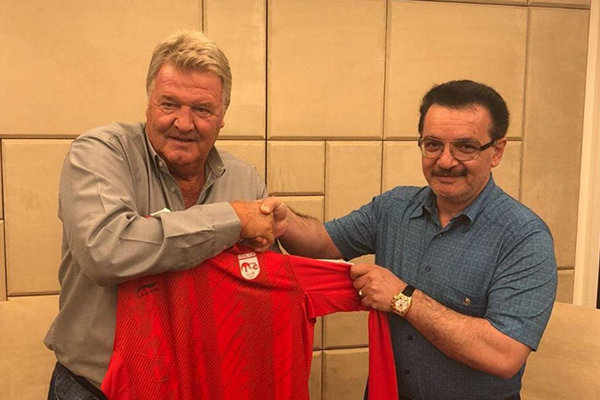Toshack's time in Iran barely a Ta-briz
 |
| John Toshack at Tractor Sazi (Image: Mehr News Agency) |
John Toshack is not Cymranian. He is, of course, a Welsh football legend and while you may see him now commentating live matches and providing expert analysis, in recent years, you'll have spotted him coaching in various countries, including Macedonia, Morocco and Azerbaijan.
Toshack's last role as football manager came at Iran, where in the summer of 2018, he was appointed head coach at Tractor Sazi, based in Tabriz. In his autobiography (Toshack's Way: My Journey Through Football), he gives an open and honest account of his short, yet a rollercoaster of a stay in one of Iran's most northern cities.
Coaching in Iran didn't appear on Toshack's mind until he was offered the role. Just days before, he turned down a job to lead Cameroon's national side. After meeting with Tractor Sazi's billionaire owner Mohammad Reza Zonuzi in Turkey, the Welshman was happy to sign a deal and packed his bags off to Tabriz.
First impressions of Tabriz caught Toshack completely by surprise. He recalls: "The moment I got through the [Tabriz] airport doors I was greeted by what, quite frankly, was a frightening reception which I'd never been warned about not expected, perhaps naively. The Tractor supporters were there in full force and going absolutely crazy. From airport all the way to my hotel in the centre of the city, it was absolutely mayhem. I've never seen anything like it: people, standing up in their cars, swinging their scarves, shouting out of the windows, driving one side of my taxi and then across it to the other [...] It was quite the welcome."
The first few days started off really well for Toshack as he settled into his new surroundings. He initially stayed at the El Goli hotel, "from where you can see the city of 1.5 million people stretched out of you set in a wide river valley between two volcanic mountain ridges on either side."
Toshack joined Tractor Sazi during the World Cup 2018 which saw Iran celebrate some relative success, having been knocked out of the group stages (which also featured pre-tournament favourites Spain and Portugal) by a single point. The country, so passionate towards football, was on a high.
As time went on, Toshack was getting used to his squad and had completed a successful pre-season tournament in Turkey. Things only started to turn sour afterwards, where staff restructures were put in place due to reported contractual issues between individuals and the Iranian football federation, and members of the backroom staff and first team players were ordered by the military to serve six months as from the morning of the opening game of the domestic season. "There was a terrible sense of disbelief and sadness in the group before a ball had even been kicked. Never a dull moment," Toshack would recall.
Problems off the pitch were unsettling to say the least. Even when he had time to himself Toshack began to struggle. "I'd go into town and sit down in the square and have a coffee or something. There weren't many newspapers that I was able to read. It was difficult to occupy myself. The people of Tabriz were very polite and the club were very kind in making sure that there were staff on hand who could take me round to the shops and the bazaars, but I must confess that I'm not a great one for the tourist attractions."
Issues escalated somewhat when new players and backroom staff were being hired. There seemed to be constant and unsettling changes, giving the team very little time to gel as a unit. And in modern football, you don't often get a decent amount of time to impress the hierarchy who want wins, trophies and the best players. And even with the best players, they would get into some trouble with the authorities, which were completely out of Toshack's hands. "I witnessed problems that were new to me," he explained. "One of our new signings, Iran's left-sided attacker, [Ashkan] Dejagah, who has a full sleeve of tattoos down both arms, was summoned to the federation in Tehran to explain himself after he had worn a short sleeved shirt in one of the matches [...] It was organised chaos off the pitch while I was expected to make everything work on it."
The final straw for Toshack came after a cup tie where Tractor Sazi surrendered a 3-1 lead - and the Welshman's frustrations came pouring out. "Everything and everyone was completely negative on the return journey. Nobody spoke. I had these signs before. I was on my way [...] I left Iran three days after that cup defeat and I didn't have too much regret, apart from the obvious professional pride that had been dented and hurt." His time in Tabriz lasted just four months.
Toshack concluded his chapter on Iran quite nicely, emphasising the warmth of the people in Tabriz, "something I'll always be grateful for." And he rightly takes pride in his record on the pitch - losing one match in six league games, against Esteghlal, a giant in Iranian football.
As a Cymranian, I certainly wanted Toshack to remain in Iran for much longer. But the country takes its football incredibly seriously and has a vision of its league being on par with the bigger European leagues. It is a long way off, and politically, it'll take Iran a good few years yet for it to be an accessible league for the masses. Only one day will the football bosses appreciate that the clubs they own will need to walk before they can run.

Comments
Post a Comment